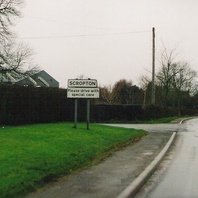
Viking Names
Scropton
Scropton, in the Appletree Hundred of Derbyshire, comes from the Old Norse male personal name Skropi and the Old English tun ‘farm, settlement’. It is thus a hybrid name. It is a joint parish with Foston.
Read More
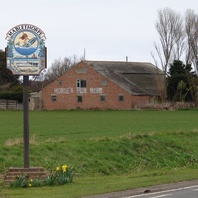
Viking Names
Mablethorpe
Marblethorpe, in the Calceworth Wapentake of Lincolnshire, comes from a likely Continental Germanic male personal name Malbert and Old Norse þorp ‘a secondary settlement, a dependent outlying farmstead or hamlet’.
Read More
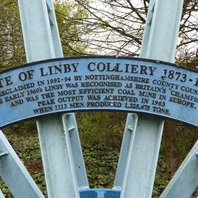
Viking Names
Linby
Linby, in the Broxtow Wapentake of Nottinghamshire, comes from Old Norse lind ‘a lime tree’ and by ‘a farmstead, a village’.
Read More

Viking Names
Scartho
Scartho, in the Bradley Wapentake of Lincolnshire, is a difficult name. The second element is clearly Old Norse haugr ‘a hill, a mound’. The first element, however, has been the subject of much discussion. It has been suggested that the first element is the Old Norse male personal name Skarði or the Old Norse element skarð ‘an opening, an open place in the edge of something, a gap, a mountain pass’. Since the area is now built up, it is nearly impossible to determine the exact topography of the place. It may be pointed out that there are patches of glacial sand and gravel and alluvium at the top of the hill. It has also been suggested based on forms of the name in Scarf- that the first element is Old Norse skarfr ‘a cormorant’, but these spellings occur in only one source. On balance, skarð provide an acceptable first element, but twentieth-century development makes certainty impossible.
Read More

Viking Names
Willoughby Waterleys
Willoughby Waterleys, in the Guthlaxton Hundred of Leicestershire, is an Anglo-Scandinavian compound from Anglian wilig ‘a willow-tree’ and Old Norse by ‘a farmstead, a village’. This is a common hybrid place-name and in most cases of usage it is a Scandinavianized form of Old English wiligtun ‘farmsted or village where the willows grow’. Some names of this type may conceal the Old English wiliga-beag ‘a circle of willow-trees’. Willoughby is a well-watered parish and lies on gravel and clay between two arms of the Whetstone Brook and has many large pools in its vicinity. Therefore its affix Waterleys from Old English leah ‘a forest, wood, glade, clearing; (later) a pasture, meadow’ and Old English wæter (Old English) ‘water, a river, a lake’ is appropriate. The affix was likely added at a later date to distinguish this Willoughby from Willoughby on the Wolds just beyond the Nottinghamshire boundary to the north.
Read More
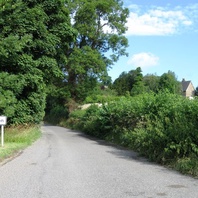
Viking Names
Kirk Ireton
The first element of Kirk Ireton, in the Wirksworth Hundred of Derbyshire, is the genitive singular or plural of the Old Norse ethnonym Íri, ‘an Irishman; probably also a Norseman who had lived in Ireland’ combined with the Old English element tun ‘an enclosure; a farmstead; a village; an estate’. Old Norse kirkja ‘a church’ was affixed at a later date. Traditionally, the place-name has been interpreted as referring to a settlement of Irishmen; probably Norsemen who lived in Ireland. However, the exact implications of such a name are not yet fully understood and are the subject of ongoing work by Dr Jayne Carroll of the Institute for Name-Studies, University of Nottingham.
Read More
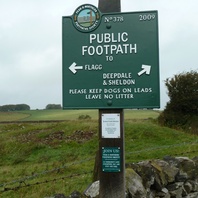
Viking Names
Flagg
Flagg, in the High Peak Hundred of Derbyshire, is a simplex place-name perhaps from the dative plural form (-um) of Old Norse flag ‘a turf, a sod’ with the meaning ‘place where the turfs were cut’.
Read More
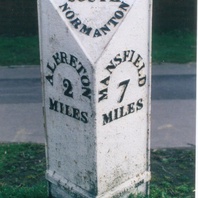
Viking Names
South Normanton
South Normanton, in the Scarsdale Hundred of Derbyshire, takes its name from the Old English ethnonym Norðman ‘Northman, Norwegian’ and the Old English element tun ‘farm, settlement’. There are several places of this name, predominantly in the East Midlands: five in Nottinghamshire, also others in Derbyshire, Leicestershire, Lincolnshire and Rutland, and one in the West Riding of Yorkshire. The prefix South distinguishes it from Temple Normanton, formally North Normanton. Traditionally, the place-name has been interpreted as referring to a settlement of Norwegians (in an area where most of the Scandinavian settlers were Danes). However, the exact implications of such a name are not yet fully understood and are the subject of ongoing work by Dr Jayne Carroll of the Institute for Name-Studies, University of Nottingham.
Read More
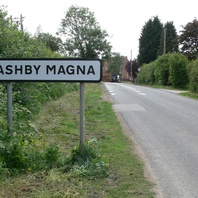
Viking Names
Ashby Magna
Ashby Magna, in the Guthlaxton Hundred of Leicestershire, is likely an Anglo-Scandinavian name coming from Old English æsc ‘ash-tree’ and Old Norse by ‘a farmstead, a village’. Some spellings may show influence of Old Norse eski ‘a place growing with ash-trees’ or even Old English esce ‘a stand of ash-trees’ on the first element. Ashby is a common place-name, but is is uncertain whether this name is an Old English creation Scandinavianized (i.e replacing Old English tun ‘an enclosure; a farmstead; a village; an estate’ with Old Norse by) or whether the name is fully Scandinavian in origin, with Old English æsc (Middle English ash) replacing Old Norse askr ‘ash-tree’. The affix Medieval Latin magna ‘great’ differentiates the township from Ashby Parva, which lies approximately three miles to the south-west.
Read More
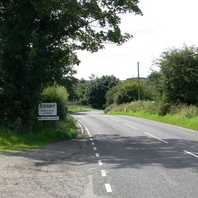
Viking Names
Cosby
The first element of Cosby, in the Guthlaxton Hundred of Leicestershire, is uncertain. It is likely the Old Norse male personal name Kopsi or Kofsi (genitive singular Kofsa) with Kofsa– assimilated to Cossa-. Alternatively the first element could be the Old English male personal name Cos(s)a which appears in such place-names as Cosham, Hampshire, Corsham, Wilshire and Cossington, Leicestershire. The second element is Old Norse by ‘a farmstead, a village’.
Read More

Viking Names
Coston
Coston, in the Framland Hundred of Leicestershire, is a Anglo-Scandinavian hybrid place-name probably coming from the Old Norse male personal name Kátr (genitive singular Káts), presumably an original byname from the Old Norse adjective kátr ‘glad’, combined with the Old English tun ‘an enclosure; a farmstead; a village; an estate’.
